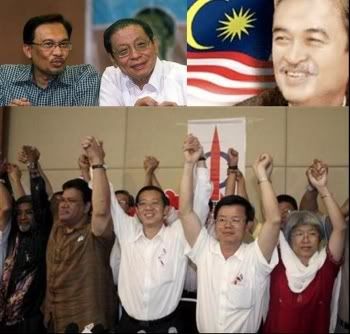The latest Raffles Conversation in Singapore's The Business Times profiles the co-author of the controversial Sarbanes-Oxley Act to help contain corporate scandals in the US.
Will we see the end of big corporate scandals in the decadent US? Don't bet on it.
Business Times - 29 Mar 2008
In defence of Sarbanes-Oxley
Paul Sarbanes, co-author of the ground-breaking securities law which bears his name, tells WONG WEI KONG why corporate America is far better off with it
FEW political careers can count the removal of the US President and the passing of one of the most important securities legislations in history as highlights, but Paul Sarbanes is a man for times of impeachment and scandals. In three decades in the US Senate, Mr Sarbanes earned a reputation for working quietly behind the scenes on complex issues before announcing his retirement in 2006. The Democrat was Maryland's longest-serving senator, called by some as 'the man who cannot be removed'.
But what thrust the low-profile Mr Sarbanes into the glare of world scrutiny was the ground-breaking securities law he co-authored as chairman of the Senate Banking Committee with House Representative Michael Oxley in 2002 and which bears his name - the Sarbanes-Oxley Act or SOX.
As the retired senator recounted in a recent interview with BT, President George W Bush called SOX 'the most far-reaching reforms of American business practices since the time of Franklin D Roosevelt' when he signed it into law.
Despite its fierce critics, Mr Sarbanes' assessment of SOX is unequivocal: corporate America is far better off with it.
'The system is in place and working. I think it has made a substantial difference for the better,' he says. Mr Sarbanes was in Singapore at the invitation of The Asian Banker to speak to a gathering of business leaders, where he predictably found himself addressing some of the criticism against SOX.
SOX came into being as a response to a number of major corporate and accounting scandals in the US, including Enron and WorldCom. The scandals cost investors billions of dollars when the share prices of the affected companies collapsed, and shook public confidence in the nation's securities markets.
The legislation, which does not apply to privately held companies, aimed at creating a strong independent oversight board to oversee the auditors of public companies. It addressed conflicts of interest, ensured auditor independence, required corporate leaders to be personally responsible for the accuracy of their company's financial reports, and established safeguards to protect against conflicts of interests involving investment analysts. The Act also established a new quasi-public agency, the Public Company Accounting Oversight Board or PCAOB, which is charged with overseeing, regulating, inspecting, and disciplining accounting firms in their roles as auditors of public companies.
Debate, however, has continued over the perceived benefits and costs of SOX. Supporters contend that the legislation was necessary and has played a useful role in restoring public confidence in the nation's capital markets. Critics charged that it was too burdensome and costly, especially for smaller firms, with US companies spending a total of US$6 billion last year on SOX compliance. It also made US exchanges less attractive to foreign companies.
Internal controls
To Mr Sarbanes, it all comes down to a simple question. 'Every public company should have an acceptable system of internal financial controls. I think that's part of being a public company. For most people, if someone came up to them and wanted them to invest money in a company and they ask, how good is your system of financial controls? - If the person says we don't have a system of financial controls, we don't believe in having such a thing, we think it's a burden, I doubt people would put their money in such a company. You wouldn't put your money in a company like that.'
Asked if a code of best practices - using a 'comply or explain' approach - would be a better way to good corporate governance than an overarching legislation like SOX, Mr Sarbanes says different markets need different approaches. 'I think it depends very much on the circumstances of particular markets and the culture of those markets. I didn't think 'comply and explain' will work in the US because I think you will have 'all explain and no comply'.' He notes, too, that in markets like Singapore, where 'comply and explain' applies to certain aspects of corporate governance, there are other requirements which are law. 'Generally, worldwide, there has been a movement towards the standards of SOX. Regulators around the world either independently through their own analysis or with reference to SOX have put into place many of the provisions regarding best practices.'
Moves by US regulators to extend the deadline for smaller companies to comply with SOX while deciding how the law should apply to these firms do not undermine the legislation in any way, Mr Sarbanes says. 'When we drew up SOX, we left a lot of discretion with the regulators to fine-tune these requirements. That's how the system was supposed to work. You adapt the protocol to make it less burdensome and yet at the same time provide investor protection, and I think that's all to the good.'
In reply to critics who charge that good corporate ethics are better brought about by education than tough laws, Mr Sarbanes says the two are not contradictory. 'The temptation to depart from high standards can be very great because, often, it seems that you can make a lot of money in a very short time. So you need to have a monitoring system to check people from departing from proper practices and you also need to be constantly emphasising to people the importance of following proper practices out of their own decision and their own choice.'
Mr Sarbanes also disagrees with claims that SOX has made US markets less competitive against other exchanges. 'Let me put that into context with two general observations. For decades, countries around the world have been urged to develop the capitals markets and that's what they've been doing. Secondly, you have significant economic growth elsewhere, with Asia as the prime example. So there is capital available and liquidity to underwrite these capital markets. You have significant financial centres in Singapore and elsewhere so in effect, you're getting a globalisation of the financial services industry. You have a more competitive situation so I don't think it squares with current developments that New York would dominate in the way it used to.'
'Having said that, I think it can still compete effectively and it has been doing that. The figures go up and down but studies have shown that foreign issuers who list on the New York capital market get a premium from investors who are prepared to pay more because they are sure that if these firms meet the listing standards there, it says something about the level of corporate governance of the firm.'
Recalling the days after the Enron scandal, Mr Sarbanes says pushing SOX through in the first place was also not as easy as it later seemed. 'In restrospect, you look at it and think it was easy because it was passed with overwhelming margins in both houses of Congress. But getting there wasn't easy. My first task was to get it past the banking committee and we worked on that for many months and made some adjustments and some compromises. In the end, we had a 17-4 vote within the committee. All the Democrats and the majority of the Republicans voted for it and it was truly a bi-partisan judgement.'
'Four days after that, the Worldcom scandal broke. Once that happened, it gave a tremendous momentum to the legislation and that just help pushed it through because the scandal was a very large and stark reminder of the need to have such legislation.' When it went to Congress, SOX was approved by the House of Representatives by a vote of 423-3 and by the Senate by 99-0.
Asked if more could have been included in SOX - such as checks against excesses in top executive pay - given the strong political and public support at the time, Mr Sarbanes says he did not think so. 'I'm not sure we would have succeeded with putting in a lot more. It's like a train leaving the station. If you put too much weight on the train, it wouldn't be able to make it out of the station. So we had to be very careful.'
'And compensation is a very complex issue. It's not clear that it's an issue one deals with legislation. You need to have a clear understanding of the inner workings of the corporation. I don't think you can get government into setting the salaries and the compensation of executives. But we now require the full disclosure of compensation and the expensing of stock options.'
Turning to the present sub-prime crisis, Mr Sarbanes says it is a very different situation from what SOX dealt with. 'SOX dealt with corporate governance, audit requirements and the requirement that companies honestly report their financials. It didn't deal with bad economic or business decisions. That's part of the economic decision process and some people make good judgements and some people make bad judgements.'
'The current crisis comes from obviously bad economic decisions. A number of people operated on the premise that everything would go up, they were highly leveraged and they were developing more and more exotic mortgage products and now they are paying the consequences for it.'
'Overall, the risk management system has been inadequate. I think the supervision by regulatory authorities has fallen short. A lot of what was going on in the sub-prime mortgage market shouldn't have been allowed. They were giving mortgages to people without documentation of income to show that they are able to pay. They had products which gave you a very low teaser interest rates for a couple of years and then the rates would jump up and the mortgage payments jump up substantially and there is nothing to show that these people with such mortgages would be able to hang on to the monthly payments. The consequences of all of this is to create a crisis of confidence. The part of the total market that the sub-prime loans occupy is relatively small but the spill-over from it led to the seize-up in credit.'
Mr Sarbanes says policy-makers now face a dilemma which he and his colleagues did not have to grapple with in the days after Enron. 'We didn't have the same counter-prevailing conditions. The current situation is more complex.'
'On the one hand, the people who made these bad judgements, many of whom had engaged in speculative activity, should bear the consequences of their actions. Unless punished by market forces, the danger is that others would repeat the process in the future. On the other hand, as much as they should bear the consequences, if that ends up throwing the economy into a down-spin and you have a broad negative economic impact, that creates quite a huge problem in your hands. People totally unconnected with these issues will be impacted.'
'I think the Fed and other economic policy-makers are trying to work their way through these competing considerations ... so we just have to see how it develops.'
For Mr Sarbanes, SOX capped a long and distinguished career. Born to Greek immigrants, he grew up in Maryland's Eastern Shore in the city of Salisbury. Mr Sarbanes attended Princeton University, earning a bachelor's degree in 1954. He was awarded a Rhodes Scholarship that brought him to Balliol College of the University of Oxford in Oxford, England, graduating with a First Class degree in 1957. He then returned to the US and attended Harvard Law School.
After graduating in 1960, he clerked for Federal Judge Morris A Soper before entering private practice with two Baltimore, Maryland law firms. In 1966, Sarbanes ran for the Maryland House of Delegates in Baltimore City and won. He was elected to the US House of Representatives in 1970 and was re-elected in 1972 and 1974. In 1976, Mr Sarbanes became a US Senator and was re-elected in 1982, 1988, 1994, and 2000.
It was during his service in the House, in August 1974, that Mr Sarbanes was selected by his Democratic colleagues on the House Watergate Committee to introduce the first Article of Impeachment, for obstruction of justice, against President Richard Nixon. President Nixon later resigned before the impeachment proceedings were brought to bear.
Other weighty issues followed for Mr Sarbanes over the years. He helped lead the successful 22-day debate on the Senate floor to ratify the Panama Canal treaty, earning him the enmity of conservative groups. He served on the committee investigating the Iran-contra scandal, where he criticised President Ronald Reagan for allowing a 'junta in the White House'. He also served as ranking Democrat on the Senate Whitewater Committee which investigated President Bill Clinton's real estate dealings in the Whitewater scandal and the suicide of Deputy White House Counsel Vincent W Foster Jr.
'It's interesting that at the beginning of my career in Congress I was involved in the very large issue of impeachment and at the end of my career in the Senate, I had the opportunity to be involved in SOX. There have been other issues in between but those two stand out,' he says.
'In terms of gravity, I think nothing is comparable to impeachment proceedings. After all, you are removing an elected president chosen by the people directly. You are removing the president from office. That was a very big step to take. That was a very momentous issue to be involved in. I was very mindful of that at the time and have remained so.'
'On the other hand, I think SOX will have a lasting impact and a lasting history. I think it would be an impact for the good.'
Still adjusting to life after retirement, Mr Sarbanes, just past his 75th birthday, does 'a little speaking and teaching'. The torch, though, has been passed on. His son, John Sarbanes, won the election for Maryland's Third congressional district in 2006, the district that Mr Sarbanes represented prior to his election as Senator. 'The moment I left Congress, my son entered Congress. That's really very satisfying.'
 This was a drawing done by Mark Malloy, a dear friend of Eddie in his Notre Dame days. Below is a summary of his email to me few months ago, explaining the drawing and photo taken then. Mark, thank you for your email and the potraits. I finally have the courage to post this.
This was a drawing done by Mark Malloy, a dear friend of Eddie in his Notre Dame days. Below is a summary of his email to me few months ago, explaining the drawing and photo taken then. Mark, thank you for your email and the potraits. I finally have the courage to post this.  To tell you the truth I have not wanted to mail these things to you. As it turns out, mailing them confirms that he is gone and I just do not want that to be true. However, you are the one who should be comforted by them and not me. They have been on our family's mantle since April 1st.
To tell you the truth I have not wanted to mail these things to you. As it turns out, mailing them confirms that he is gone and I just do not want that to be true. However, you are the one who should be comforted by them and not me. They have been on our family's mantle since April 1st. 

















